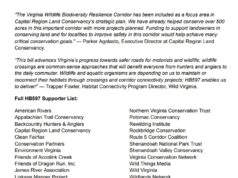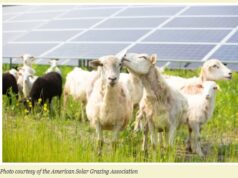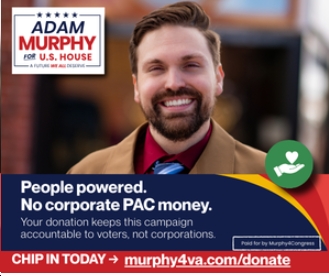Finally, here it is…the bill a lot of us have been waiting for…the Virginia Clean Economy Act (VCEA) – see below. Now that there’s an actual bill, and not just FAQs (which you can compare to here), it will be interesting to see what exactly is in it. I’m going to dive into it now, but wanted to get it out here quickly, since a lot of people have been asking about it.
UPDATE: The bill says that “‘Renewable energy’ shall have the same meaning ascribed to it in § 56-576, excluding any biomass and municipal solid waste other than energy from waste.” In § 56-576, it says that renewable energy is defined as “energy derived from sunlight, wind, falling water, biomass, sustainable or otherwise, (the definitions of which shall be liberally construed), energy from waste, landfill gas, municipal solid waste, wave motion, tides, and geothermal power, and does not include energy derived from coal, oil, natural gas, or nuclear power.” So that seems good, if I’m reading it correctly, as it would mean that truly “clean energy” – NOT counting nuclear power – would constitute 41% of Virginia’s power mix by 2030, 61% by 2036, 81% by 2043 and 97% by 2049. But I’d like to have that absolutely confirmed…
Also, this looks good: “The Commission shall establish by regulation a program that affords eligible customer generators the opportunity to participate in net energy metering, and a program, to begin no later than July 1, 2014, for customers of investor-owned utilities…”
This is interesting: “If the Commission determines the utility meets in any year the annual energy efficiency standards set forth in § 56-596.2, the Commission shall award a performance incentive, which shall be at least the additional recovery of a margin on efficiency program operating expenses in that year, to be recovered through a rate adjustment clause under this subdivision, which margin for the purposes of this section shall be equal to the general rate of return on common equity determined as described in subdivision…The Commission shall also award an additional twenty basis points, to be included in the performance incentive, for each additional incremental 0.1% in annual savings in any year, beyond the annual requirements set forth in § 56-596.2, provided that the total performance incentive awarded in any year shall not exceed ten percent (10%) of that utility’s total energy efficiency program spending in that same year.”
Also see, on page 80, check out the energy efficiency goals. I’d say they should be even more aggressive, given that energy efficiency is the biggest “bang for the buck” in terms of carbon reductions, and also that Virginia – thanks to Dominion, and current Virginia law, being horrible, basically – is wayyy behind the curve on energy efficiency improvements.
This looks solid, also better than the FAQs released on 12/19/19: “Prior to January 1, 2034, and subject to the requirements of this section, a Phase II Utility, as that term is defined in subdivision A 1 of § 56-585.1 of the Code of Virginia, shall construct, acquire, or purchase the energy and capacity from Qualified Offshore Wind Projects having an aggregate rated capacity of not less than 5,200 megawatts, subject to the requirements of this section. A Phase II Utility shall place 2,600 megawatts in service by 2030 and an additional 2,600 megawatts in service by 2034.”
This looks good too: “A Phase II Utility, or an affiliate thereof, shall have the option to own at least 50% of the equity of any Qualified Offshore Wind Project located within the Virginia WEA.”
This is good as far as it goes, but should it be even higher?: “At least thirty-five percent of the renewable energy resources procured by a utility for purposes of complying with the RPS Goals shall be from the purchase of energy, capacity, or environmental attributes from facilities owned by persons other than a public utility.”
This looks promising: “The Commission shall open up a proceeding to identify and develop appropriate mechanisms and programs to achieve a 2,400 megawatt energy storage deployment target for the Commonwealth. No later than January 1, 2021, the Commission shall adopt regulations for the implementation of the energy storage deployment target”
As does this: “…a utility shall not recover any costs associated with the construction of renewable energy generation facilities unless such facilities are developed through transparent and competitive solicitation processes as detailed in subsection G and the Commission finds such costs to be reasonable and prudent”
This sounds a bit like a moratorium on new fossil-fuel power plants, eh? “In promulgating its regulations to reduce carbon dioxide emissions from covered units described in § 10.1-1308, the Air Pollution Control Board shall consult with the Department of Mines, Minerals, and Energy, the State Corporation Commission, the Office of the Attorney General, and appropriate stakeholders and report to the General Assembly by January 1, 2021 on any recommendations on how to achieve 100 percent carbon free electric energy generation by 2050 in a least-cost manner for ratepayers. Such report shall include a recommendation on whether the General Assembly should permanently repeal the ability to obtain a certificate of public convenience and necessity for electric generating units that emits carbon as a byproduct of combusting fuel to generate electricity. Until the General Assembly receives such report, the Commission shall not issue a certificate for public convenience and necessity for any investor-owned utility to own, operate, or construct any electric generating unit that emits carbon as a byproduct of combusting fuel to generate electricity.”


![Video: Ivy Main Says “the hostility to offshore wind is really just [Trump]; nobody else feels this way…he will be gone and then we will get back on track”](https://bluevirginia.us/wp-content/uploads/2026/02/axiosivymain-238x178.jpg)









